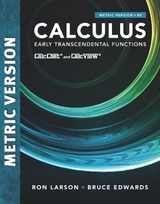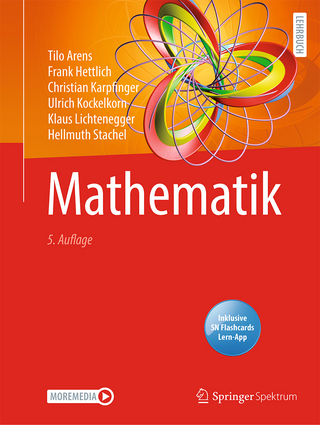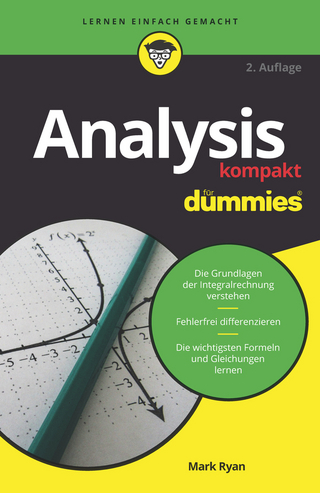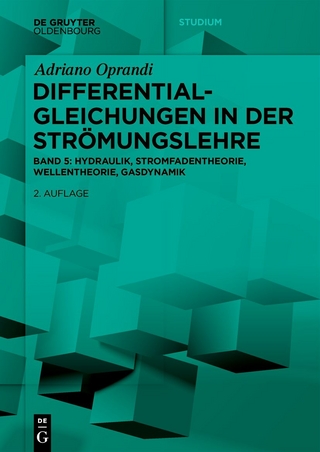
Calculus: Early Transcendental Functions, International Metric Edition
Brooks/Cole (Verlag)
978-1-337-78243-2 (ISBN)
- Titel erscheint in neuer Auflage
- Artikel merken
Dr. Ron Larson is a professor of mathematics at the Pennsylvania State University, where he has taught since 1970. He is considered the pioneer of using multimedia to enhance the learning of mathematics, having authored more than 30 software titles since 1990. Dr. Larson has also authored numerous acclaimed textbooks, including the best-selling calculus series coauthored with Dr. Bruce Edwards and published by Cengage. Dr. Larson received the 2017 William Holmes McGuffey Longevity Award for PRECALCULUS and for CALCULUS. He also received the 2018 Text and Academic Authors Association TEXTY Award for CALCULUS: EARLY TRANSCENDENTAL FUNCTIONS. In addition, Dr. Larson received the 1996 Text and Academic Authors Association TEXTY Award for INTERACTIVE CALCULUS -- a complete text on CD-ROM that was the first mainstream college textbook to be offered on the internet. Dr. Bruce H. Edwards is a professor of mathematics at the University of Florida. Dr. Edwards received his B.S. in mathematics from Stanford University and his Ph.D. in mathematics from Dartmouth College. He taught mathematics at a university near Bogot�, Colombia, as a Peace Corps volunteer. While teaching at the University of Florida, Dr. Edwards has received many teaching awards, including Teacher of the Year in the College of Liberal Arts and Sciences, Liberal Arts and Sciences Student Council Teacher of the Year and the University of Florida Honors Program Teacher of the Year. He was selected by the Office of Alumni Affairs to be the Distinguished Alumni Professor for 1991-1993. Dr. Edwards has taught a variety of mathematics courses at the University of Florida, from first-year calculus to graduate-level classes in algebra and numerical analysis. He has been a frequent speaker at research conferences and meetings of the National Council of Teachers of Mathematics. He has also coauthored a wide range of award-winning mathematics textbooks with Dr. Ron Larson.
1. PREPARATION FOR CALCULUS.
Graphs and Models. Linear Models and Rates of Change. Functions and Their Graphs. Review of Trigonometric Functions. Inverse Functions. Exponential and Logarithmic Functions. Review Exercises. P.S. Problem Solving.
2. LIMITS AND THEIR PROPERTIES.
A Preview of Calculus. Finding Limits Graphically and Numerically. Evaluating Limits Analytically. Continuity and One-Sided Limits. Infinite Limits. Section Project: Graphs and Limits of Trigonometric Functions. Review Exercises. P.S. Problem Solving.
3. DIFFERENTIATION.
The Derivative and the Tangent Line Problem. Basic Differentiation Rules and Rates of Change. Product and Quotient Rules and Higher-Order Derivatives. The Chain Rule. Implicit Differentiation. Section Project: Optical Illusions. Derivatives of Inverse Functions, Related Rates. Newton's Method. Review Exercises. P.S. Problem Solving.
4. APPLICATIONS OF DIFFERENTIATION.
Extrema on an Interval. Rolle's Theorem and the Mean Value Theorem. Increasing and Decreasing Functions and the First Derivative Test. Section Project: Even Fourth-Degree Polynomials. Concavity and the Second Derivative Test. Limits at Infinity. A Summary of Curve Sketching. Optimization Problems. Section Project: Minimum Time. Differentials. Review Exercises. P.S. Problem Solving.
5. INTEGRATION.
Antiderivatives and Indefinite Integration. Area. Riemann Sums and Definite Integrals. The Fundamental Theorem of Calculus. Section Project: Demonstrating the Fundamental Theorem. Integration by Substitution. Indeterminate Forms and L�Hopital�s Rule. The Natural Logarithmic Function: Integration. Inverse Trigonometric Functions: Integration. Hyperbolic Functions. Section Project: Mercator Map. Review Exercises. P.S. Problem Solving.
6. DIFFERENTIAL EQUATIONS.
Slope Fields and Euler's Method. Growth and Decay. Separation of Variables. The Logistic Equation. First-Order Linear Differential Equations. Section Project: Weight Loss. Predator-Prey Differential Equations. Review Exercises. P.S. Problem Solving.
7. APPLICATIONS OF INTEGRATION.
Area of a Region Between Two Curves. Volume: The Disk Method. Volume: The Shell Method. Section Project: Saturn. Arc Length and Surfaces of Revolution. Work. Section Project: Pyramid of Khufu. Moments, Centers of Mass, and Centroids. Fluid Pressure and Fluid Force. Review Exercises. P.S. Problem Solving.
8. INTEGRATION TECHNIQUES AND IMPROPER INTEGRALS.
Basic Integration Rules. Integration by Parts. Trigonometric Integrals. Section Project: The Wallis Product. Trigonometric Substitution. Partial Fractions. Numerical Integration. Integration by Tables and Other Integration Techniques. Improper Integrals. Review Exercises. P.S. Problem Solving.
9. INFINITE SERIES.
Sequences. Series and Convergence. Section Project: Cantor's Disappearing Table. The Integral Test and p-Series. Section Project: The Harmonic Series. Comparisons of Series. Alternating Series. The Ratio and Root Tests. Taylor Polynomials and Approximations. Power Series. Representation of Functions by Power Series. Taylor and Maclaurin Series. Review Exercises. P.S. Problem Solving.
10. CONICS, PARAMETRIC EQUATIONS, AND POLAR COORDINATES.
Conics and Calculus. Plane Curves and Parametric Equations. Section Project: Cycloids. Parametric Equations and Calculus. Polar Coordinates and Polar Graphs. Section Project: Cassini Oval. Area and Arc Length in Polar Coordinates. Polar Equations of Conics and Kepler's Laws. Review Exercises. P.S. Problem Solving.
11. VECTORS AND THE GEOMETRY OF SPACE.
Vectors in the Plane. Space Coordinates and Vectors in Space. The Dot Product of Two Vectors. The Cross Product of Two Vectors in Space. Lines and Planes in Space. Section Project: Distances in Space. Surfaces in Space. Cylindrical and Spherical Coordinates. Review Exercises. P.S. Problem Solving.
12. VECTOR-VALUED FUNCTIONS.
Vector-Valued Functions. Section Project: Witch of Agnesi. Differentiation and Integration of Vector-Valued Functions. Velocity and Acceleration. Tangent Vectors and Normal Vectors. Arc Length and Curvature. Review Exercises. P.S. Problem Solving.
13. FUNCTIONS OF SEVERAL VARIABLES.
Introduction to Functions of Several Variables. Limits and Continuity. Partial Derivatives. Differentials. Chain Rules for Functions of Several Variables. Directional Derivatives and Gradients. Tangent Planes and Normal Lines. Section Project: Wildflowers. Extrema of Functions of Two Variables. Applications of Extrema of Functions of Two Variables. Section Project: Building a Pipeline. Lagrange Multipliers. Review Exercises. P.S. Problem Solving.
14. MULTIPLE INTEGRATION.
Iterated Integrals and Area in the Plane. Double Integrals and Volume. Change of Variables: Polar Coordinates. Center of Mass and Moments of Inertia. Section Project: Center of Pressure on a Sail. Surface Area. Section Project: Surface Area in Polar Coordinates. Triple Integrals and Applications. Triple Integrals in Cylindrical and Spherical Coordinates. Section Project: Wrinkled and Bumpy Spheres. Change of Variables: Jacobians. Review Exercises. P.S. Problem Solving.
15. VECTOR ANALYSIS.
Vector Fields. Line Integrals. Conservative Vector Fields and Independence of Path. Green's Theorem. Section Project: Hyperbolic and Trigonometric Functions. Parametric Surfaces. Surface Integrals. Section Project: Hyperboloid of One Sheet. Divergence Theorem. Stokes's Theorem. Review Exercises. Section Project: The Planimeter. P.S. Problem Solving.
16. SECOND ORDER DIFFERENTIAL EQUATIONS (ONLINE).
Exact First-Order Equations. Second-Order Homogeneous Linear Equations. Second-Order Nonhomogeneous Linear Equations. Section Project: Parachute Jump. Series Solutions of Differential Equations. Review Exercises. P.S. Problem Solving.
APPENDIX.
A. Proofs of Selected Theorems (Online).
B. Integration Tables.
C. Precalculus Review. (Online).
C.1 Real Numbers and the Real Number Line. C.2 The Cartesian Plane.
D. Rotation and the General Second-Degree Equation (Online).
E. Complex Numbers. (Online).
F. Business and Economic Applications. (Online).
G. Fitting Models to Data. (Online).
| Erscheinungsdatum | 13.02.2018 |
|---|---|
| Verlagsort | CA |
| Sprache | englisch |
| Maße | 217 x 275 mm |
| Gewicht | 2495 g |
| Themenwelt | Schulbuch / Wörterbuch ► Schulbuch / Allgemeinbildende Schulen |
| Mathematik / Informatik ► Mathematik ► Analysis | |
| ISBN-10 | 1-337-78243-2 / 1337782432 |
| ISBN-13 | 978-1-337-78243-2 / 9781337782432 |
| Zustand | Neuware |
| Haben Sie eine Frage zum Produkt? |
aus dem Bereich



